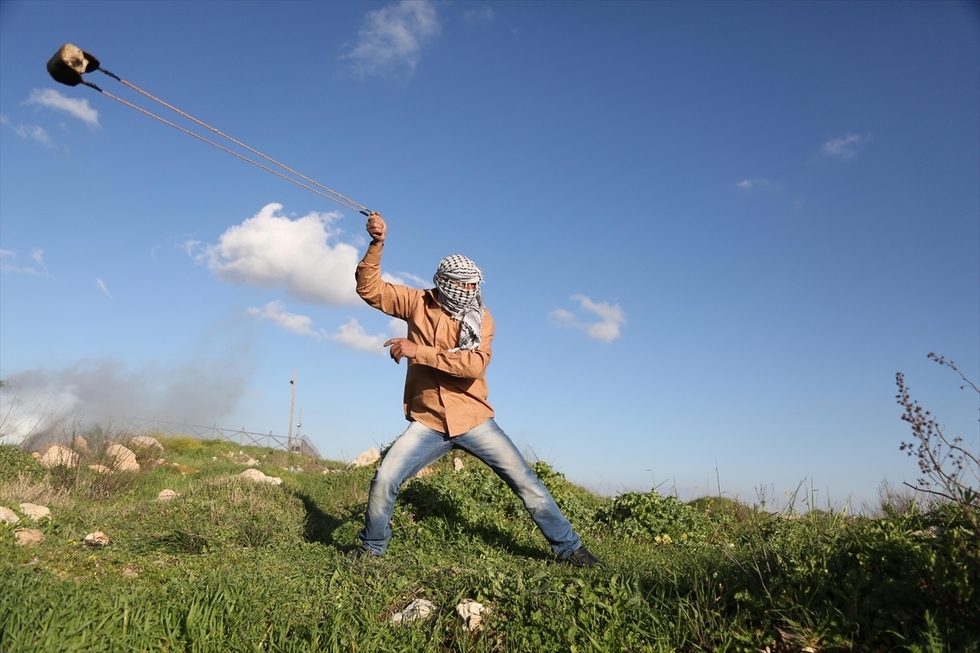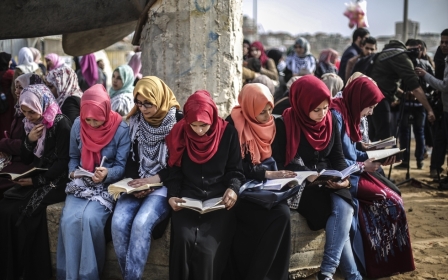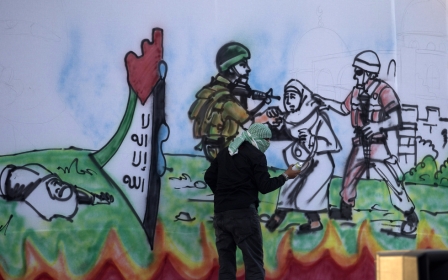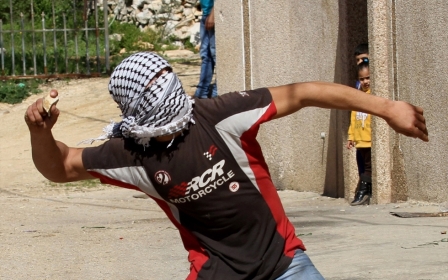Third intifada, terror wave, the 'situation': Just don't mention the 'O' word to Israelis

It is six months into the third Intifada and the Israelis are frustrated; they sense chaos and a constant inability to create order. The Israeli leadership does not understand what to do when it appears that there is no leadership behind the young people who attack Israelis.
And indeed the old order has collapsed. It is interesting that before going to attack Israelis, the last words of young Palestinians to the “old” Palestinian leadership, are: “Don’t print posters after I die, don’t take responsibility for my actions. I am independent.”
The Israelis refuse to see that they themselves are the reason for this uprising, so every day they come up with a new analysis of what’s behind it. Today it’s social media, yesterday it was the Palestinian media and the day before it was the economy. The bottom line, as community activist Jamal Juma says, is that “they don’t see us, they don’t want to acknowledge our needs.”
The Israeli Security Agency (Shabak) has issued several reports about what it calls the latest “wave of terror attacks”. The word military occupation or its euphemism - Israeli military presence - do not appear in these reports.
I noticed that it has become unfashionable to use the word occupation among Israeli Jews, in daily conversations and on Israeli media, so it is alarming when security discourse and popular discourse sound the same.
For example, two teenagers were invited by Israeli national radio to give a summary of 2015. They were asked to invite young people from a variety of social and political groups to express their wishes for the New Year. But when the producer of the show heard that the left-wing Jewish interviewee who was invited was about to wish that the occupation ends in 2016, the two teenagers were told to make sure he does not use that word.
A few weeks later Ynet, a popular news website, interviewed some Jews and Palestinians who were conducting dialogue in the north of the country.
The reporter described the good atmosphere in the group, which was followed by a quote from the Palestinian coordinator of the programme, who told the participants: “Don’t forget that the occupation has not ended,” meaning there is still a lot of work to be done. Ynet cleaned up this sentence and reported him saying: “Don’t forget that the conflict is still going on.” The word "conflict" hints at symmetry, the word "occupation" does not hint; it points a clear finger at those who are occupiers and those who are occupied.
My last example is from January, when the public discourse was obsessed with UN Secretary-General Ban Ki-moon’s statement which included the following: “Palestinian frustration is growing under the weight of a half century of occupation and the paralysis of the peace process.” He dared mention the occupation as the cause for the uprising. The radio announcer in one of the popular news programmes asked: is Ban Ki-moon ignorant and doesn’t understand anything, or is he simply evil?
The Palestinians call these last months the third intifada, the Israelis call it a terror wave. Some Israelis have begun debating if it's another intifada, and the extreme right say it is part of an international terror wave. When Israelis and Palestinians meet, they refer to the events as “the situation”.
Israel and the Kenyan Mau Mau
The difficulty in naming is symptomatic of the difficulty to agree what is going on. I was reminded of the British in Kenya. In the 1950s, they too were perplexed and had difficulty understanding why the Mau Mau were revolting against their rule.
By then, the British had been in Kenya for over 70 years (very similar to the Israeli rule); they had confiscated land, brought in British settlers, forced people off their land and into the cities and killed many of the Kikuyu. The colonialists believed they were bringing development, modernity and civilization, but a group of the Kikuyu called the Mau Mau revolted. They tried to get their land back using terror and violence against the British and against other Kenyans who collaborated with the British.
The Mau Mau hid in forests, they did not lead a movement with evident hierarchy and they did not communicate anything in writing. The British wanted to understand why the Mau Mau resisted all the good that they were bringing to Africa. Dr Carothers was send on a mission in 1954 to look for explanations to this protest movement, and suggest ways to restrain it. He came back with a report called “The psychology of the Mau Mau”. The report included analysis of the pathology of the group and suggestions for treatment and rehabilitation. The assumption was that a sane group of people would not reject all the good that was offered to them, therefore there must be a psychological explanation for the revolt.
The report is written in professional, neutral language; the Mau Mau are described as a group with primitive customs, and indeed they rejected Christian rituals and chose tribal rituals instead. There is a chapter on their belief in magic and witchcraft, which builds the foundation to explain that the Mau Mau are irrational.
The report is based on the liberal assumption that education can help break rebellious personalities. It identifies those who can be reformed and those who are hopeless. Dr Carothers was obsessed with the question of whether the revolt was organised or popular. (What the Israeli Security Agency calls "lone perpetrators" and "atmosphere attacks".)
Pathologising rebellion
The report indicated that the problem of the Mau Mau was that, unlike other Kikuyo, they did not cooperate with the authorities, and anyone who is unwilling to choose diplomacy with the authorities as their strategy must be insane and irrational. The report transformed aspirations for freedom into pathologies and diagnosed that an African who has political aspirations is mentally ill.
In addition, it concluded that the African is irrational, and chooses passion over reason. According to the report, the Mau Mau believed that the problems in their lives were a result of fate and evil forces. The influences of colonialism were not mentioned as possible sources for the Mau Mau’s problems or actions.
Coming back to our region, the Israeli-Jewish public are mainly exposed to Hebrew-speaking media. Very few consume foreign media (those who do mostly consume Russian media). Two months after the intifada began, the media reported that the Shabak gave a report about the “situation” to the government. The Shabak is considered by the Israeli Jews as an authority on security, and in comparison to the political leadership it is viewed as responsible and professional.
Societies in conflict tend to portray the enemy as their opposite. Just a few weeks ago the chief of the Israeli police force said: "While we chose to sanctify life, our enemies chose to sanctify death."
The Shabak’s report can help us learn what the Shabak wants Israelis to think about the Palestinian struggle and about themselves. The report concluded that the young lone perpetrators taking part in the current wave of escalation share the following characteristics:
- No clear political-organisational structure, clear-cut ideological modus operandi or organised leadership were found to be leading the protest;
- The motivation of the perpetrators is derived from a sense of national, economic, personal and gender-based (seven of the perpetrators were women) discrimination. Some of the perpetrators suffered from mental problems. Others viewed the attacks as means of escaping a hopeless situation that, in their view, cannot be changed.
- The perpetrators drew inspiration from the incitement found in the social networks and the inciting statements of the PA leaders.
They employed imitation which is common in the web.
- In general, the activity of the Palestinian youth generating the current wave of escalation is not organised but is of a spontaneous and popular nature. It was launched following the incitement and lies about an Israeli attempt to harm the Aqsa Mosque. These lies provided the youth with an immediate motive which is religious and symbolic. This way, the violent protest and terror are directed against Israel.
- The young people are spending their lives surfing the internet, which glorifies the Palestinian argument that the perpetrators are the victims of the "Israeli aggression, and in fact, they were executed." In addition, there is a vicious cycle of: attack – perpetrator's death – revenge for his death.
The bottom line from the report is that the Palestinians are irrational, they are emotional and motivated by rumours; they are easily incited by social media, and they are driven by their state of depression. In addition, it concludes that they are unorganised and do not follow any political strategy.
The young people are driven by different kinds of oppression: national, economic and gender, and they are driven by personal and mental problems. The attackers are motivated to act violently because they have lost their faith in their leadership and they want to destroy the existing Palestinian social order without any clear plan for the future. The violence for some is an escape from the depressing reality, which the young people believe cannot be changed. They believe everything is decided by greater forces (god).
No mention of the words "Israeli military occupation", or its euphemism “Israeli military presence”.
Naomi Mark contributed research on the Mau Mau to this piece.
- Michal Zak is a political educator, expert in Jewish-Palestinian dialogue and a resident of the Palestinian–Jewish community of Wahat al Salam-Neve Shalom, in Israel.
The views expressed in this article belong to the author and do not necessarily reflect the editorial policy of Middle East Eye.
Photo: A Palestinian youth slinging stones at Israeli security forces during a protest in the occupied West Bank on 4 March, 2016 (AFP).
Stay informed with MEE's newsletters
Sign up to get the latest alerts, insights and analysis, starting with Turkey Unpacked
Middle East Eye delivers independent and unrivalled coverage and analysis of the Middle East, North Africa and beyond. To learn more about republishing this content and the associated fees, please fill out this form. More about MEE can be found here.





